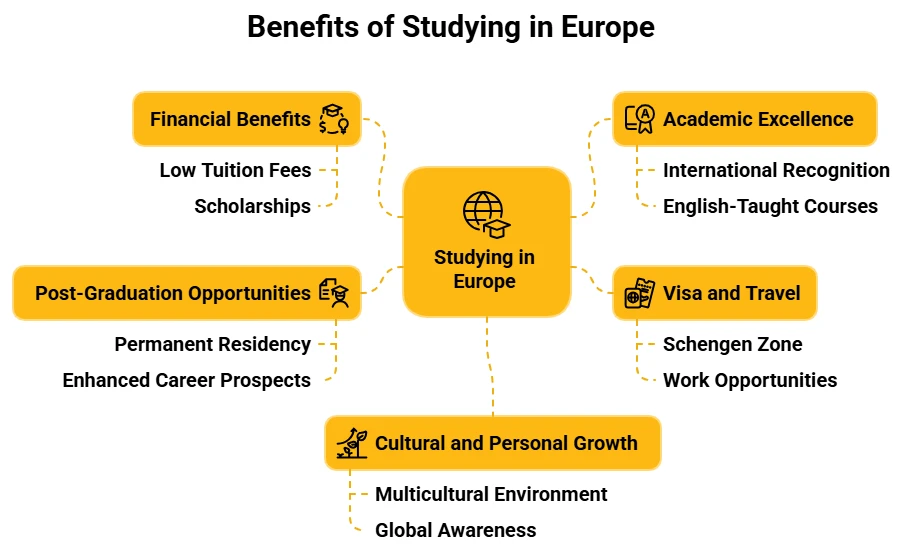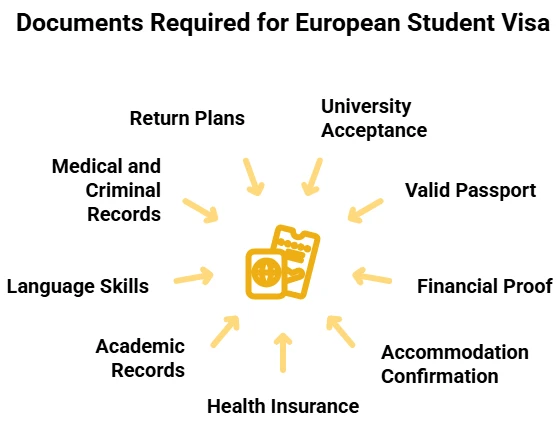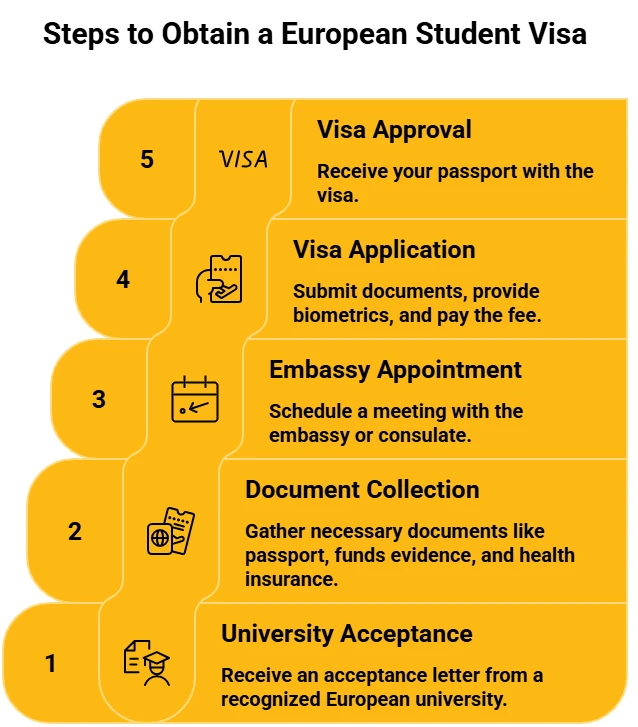Study in Europe
Don't know what to do?
Get Free Counseling
Study in Europe – Your Complete Guide to Studying Abroad from the UAE
For students in the UAE, studying in Europe presents a valuable chance to receive a great education, experience different cultures, and improve their career potential. Due to many tuition-free and low-cost schools, Europe remains a popular destination for UAE students.
- About 15,000 students from the UAE study in other countries each year, and that number is increasing.
- In 2023–24, Germany was the destination for more than 469,000 students from other countries.
- France hosted over 412,000 students from other countries that year.
- The UAE sends more students abroad than most countries in the Arab region.
- Students can get their visas processed more quickly if they apply two to three months before their programs begin.
.webp)
*Want guidance to apply for Study in Europe? Sign up with Y-Axis for comprehensive support with the process.
Why Study in Europe from the UAE?
For UAE students, Europe provides a great mix of good education, different cultures, and chances for jobs later on. Schools in Europe are known around the world for their research-based programs, classes that relate to jobs, and tuition that isn't too expensive, mainly at public schools. Since many countries teach courses in English, students from the UAE can adjust more easily.
Students can also travel without visas in the Schengen area, use top-notch facilities, and find part-time work. With its friendly atmosphere, strong job availability, and ways to stay permanently, Europe is a good option for students wanting international experience and a good future.
*Looking for assistance to apply for study abroad? Y-Axis is here to assist you with the process.
What is a Europe Student Visa?
A European student visa lets students from outside the EU, such as those from the UAE, enter and live in a European country to study. There are two main kinds: a short-stay visa (Type C) for courses lasting up to 90 days, which allows travel in the Schengen Area, and a long-stay visa (Type D) for degree programs longer than 90 days. The long-stay visa often comes with extra benefits like the option to work part-time, apply for a residence permit, and sometimes bring family. Visa rules and what you can do with the visa depend on the country.
Top Countries to Study in Europe for UAE Students
Europe presents varied study abroad options by mixing good academics, different cultures, and lower costs. For students from the UAE, some European nations are good for their English programs, supportive settings, and chances to work after school. From Germany's free schooling to the Netherlands' new ways of teaching, each country has special pluses. The best place to pick depends on what you want to study, how much money you have, and what job you want later. Here are some of the top European countries that UAE students like for college.
|
Country |
Key Highlights |
Average Tuition (Public Universities) |
Work Rights for Students |
|
Germany |
Tuition-free public universities, strong in engineering and tech |
Mostly free; semester fee ~€250–€350 |
Up to 120 full days or 240 half days/year |
|
France |
Globally ranked institutions, strong in business, arts, and fashion |
€200–€4,000 per year |
Up to 964 hours/year (~20 hrs/week) |
|
Netherlands |
English-taught programs widely available, innovative teaching |
€8,000–€15,000 per year |
16 hours/week during term |
|
Italy |
Affordable tuition, rich culture, strong in design, architecture |
€1,000–€4,000 per year |
20 hours/week |
|
Spain |
Great student life, growing in international programs |
€1,000–€3,500 per year |
20 hours/week |
|
Sweden |
High academic standards, focus on research and innovation |
€8,000–€18,000 per year |
Part-time allowed |
|
Ireland |
English-speaking, tech and business hubs, post-study visa options |
€10,000–€20,000 per year |
20 hours/week during term |
|
Finland |
High-quality education, growing number of English programs |
€4,000–€13,000 per year |
30 hours/week |
Benefits of Studying in Europe
There are multiple benefits of studying in Europe, some of which are given below.
- Many countries, such as Germany and Norway, provide higher education at little or no cost at their public universities.
- European universities are known for their academic quality and international recognition.
- Many courses are taught in English, especially at the master’s degree level.
- Most student visa holders are allowed to work while studying, which helps them gain experience and cover living costs.
- Students can travel to 26 European countries without extra visas because of the Schengen Zone.
- After graduation, many countries let students stay and provide paths to permanent residency.
- Europe has a multicultural environment that encourages global awareness and personal growth.
- Many scholarships funded by governments and universities are available to international students.
- Europe is home to major research institutions and centers of innovation
- European countries are usually ranked high in terms of safety, health care, and overall quality of life.

Popular Courses to Study in Europe
Europe has many world-class universities that provide different academic programs. These institutions are known for their good education, updated facilities, and new research in areas like engineering, tech, business, and medicine.
Many programs are in English, especially for graduate students, which make them available to students from other countries. A European education can lead to international job opportunities in tech, healthcare, design, finance, and other fields.
|
Field |
Top 5 Universities in Europe |
Popular Programs |
|
Engineering & Technology |
1. ETH Zurich (Switzerland) 2. TU Munich (Germany) 3. EPFL Lausanne (Switzerland) 4. TU Delft (Netherlands) 5. Politecnico di Milano (Italy) |
Mechanical Engineering, Electrical, Robotics, AI, Civil |
|
Business & Management |
1. INSEAD (France) 2. HEC Paris (France) 3. London Business School (UK) 4. Bocconi University (Italy) 5. Erasmus University Rotterdam (Netherlands) |
MBA, Finance, Marketing, International Business, Strategy |
|
Computer Science & IT |
1. University of Oxford (UK) 2. ETH Zurich (Switzerland) 3. University of Cambridge (UK) 4. EPFL Lausanne (Switzerland) 5. TU Munich (Germany) |
Software Engineering, AI, Cybersecurity, Data Science |
|
Medicine & Health Sciences |
1. Karolinska Institute (Sweden) 2. LMU Munich (Germany) 3. University of Oxford (UK) 4. University of Cambridge (UK) 5. University of Milan (Italy) |
Medicine (MBBS), Public Health, Dentistry, Biomedicine |
|
Arts, Design & Architecture |
1. Politecnico di Milano (Italy) 2. University of the Arts London (UK) 3. Aalto University (Finland) 4. Royal College of Art (UK) 5. Design Academy Eindhoven (Netherlands) |
Fashion Design, Interior Design, Architecture, Visual Arts |
Types of Europe Student Visas
When considering studying in Europe, it's important to know which visa you'll require. The type of student visa needed is based on how long you plan to study and the country where you'll be studying. Here are the main categories:
|
Visa Type |
Duration |
Purpose |
Key Features |
|
Type C Visa |
Short-stay (up to 90 days) |
Language courses, exchange programs, or summer schools |
Allows travel across Schengen Area but no work rights |
|
Type D Visa |
Long-stay (over 90 days) |
Full-time university studies (bachelor’s, master’s, PhD) |
May allow part-time work, renewable, and leads to residence permit |
|
Student Residence Permit |
Varies by country |
Required after arrival for long-term stay |
Allows longer stay and work; must register with local authorities |
Who Can Apply for a Europe Student Visa from the UAE?
Citizens and residents of the UAE who have been admitted to a recognized European school are eligible to apply for a European student visa. A valid passport is needed, and applicants must fulfill the entry and financial criteria of their destination country. Students below the age of 18 might need to provide parental consent forms and guardianship records. Applicants for any course, whether short-term or full-time have to provide evidence of study purpose, lodging, and adequate funds for tuition and living costs throughout their stay in Europe.
Eligibility Criteria for a European Student Visa
To study in Europe, you must provide the following documents given below:
- Acceptance from a recognized European university.
- A passport valid for at least six months after your planned stay.
- Proof that you can pay for tuition, living costs, and travel.
- Confirmation of where you will be living.
- Health insurance that works in the European country for your entire stay.
- Academic records and certificates required by the university.
- Proof of your language skills (like IELTS or TOEFL) if studying in English.
- A medical check-up and a clean criminal record, if asked.
- Plans to return home after studying or to legally stay after you graduate (depending on your visa).

Documents Required to Study in Europe from the UAE
When applying for a European student visa from the UAE, prepare these documents:
- A passport that is valid for at least six months and has at least two blank pages.
- A university acceptance letter or enrollment certificate.
- A completed visa application form for the specific country.
- Recent passport-sized photos that meet the embassy's standards.
- Evidence of enough funds (bank statements, sponsor letter, or scholarship proof).
- Health insurance that works in the country where you will be studying.
- Proof of where you will be staying (university housing confirmation or a rental agreement).
- Transcripts and certificates from your previous schools.
- Language test scores (IELTS, TOEFL, or similar), if needed.
- A travel plan or flight booking (in some situations).
- A receipt for the visa application fee.
- A consent letter from your parents (if you are under 18).
How to Apply for a Student Visa for Europe – Step-by-Step Process
The process to apply for a student visa for Europe is given below.
Step 1: Apply to a European university that is recognized and get your acceptance letter.
Step 2: Collect the needed documents. This includes your passport, evidence of funds, health insurance, and where you plan to stay.
Step 3: Set up a meeting with the embassy, consulate, or visa application center for the country where you plan to study.
Step 4: Go to your scheduled meeting to hand in your documents, provide your biometric information, and pay the fee.
Step 5: Once your application is approved, you will get your passport back that includes your Study in Europe visa.

Cost of Studying in Europe from the UAE
Detailed information about the cost of studying in Europe is given below.
|
Country |
Average Tuition Fees (Public Universities) |
Estimated Living Costs/Month |
|
Germany |
€0–€1,500 per year (mostly tuition-free) |
€800–€1,100 |
|
France |
€200–€4,000 per year |
€800–€1,200 |
|
Netherlands |
€8,000–€15,000 per year |
€900–€1,300 |
|
Italy |
€1,000–€4,000 per year |
€700–€1,100 |
|
Spain |
€1,000–€3,500 per year |
€700–€1,000 |
|
Sweden |
€8,000–€18,000 per year |
€900–€1,200 |
|
Finland |
€4,000–€13,000 per year |
€700–€1,100 |
|
Ireland |
€10,000–€20,000 per year |
€900–€1,400 |
Europe Student Visa Processing Time
Detailed information about the processing time of Europe Student Visa is given below.
|
Visa Type |
Duration of Stay |
Typical Processing Time |
|
Type C (Short-Stay) |
Up to 90 days |
10 to 15 calendar days |
|
Type D (Long-Stay) |
Over 90 days |
30 to 60 calendar days (may vary) |
|
Student Residence Permit |
Varies by country |
Additional 2–8 weeks (post-arrival) |
Scholarships for UAE Students to Study in Europe
The various scholarships that UAE students can avail of while studying in Europe are given below.
|
Scholarship Name |
Amount / Value |
What It Covers |
Eligibility Criteria |
|
Erasmus+ Scholarship |
€850–€1,200/month + tuition + travel |
Tuition, living expenses, travel, insurance |
Enrolled in Erasmus+ partner program; strong academic background |
|
DAAD Scholarships (Germany) |
€934–€1,200/month + other allowances |
Tuition (if applicable), living costs, insurance |
Bachelor’s degree, acceptance at German institution, academic merit |
|
Eiffel Excellence (France) |
€1,181/month + travel + insurance |
Monthly stipend, international travel, insurance |
Master’s/PhD applicants; under 25 (Master’s), under 30 (PhD); high academic standing |
|
Holland Scholarship |
€5,000 (one-time payment) |
Partial tuition fee |
Non-EEA students; admitted to Dutch university; strong academic record |
|
Swedish Institute Scholarship |
Full tuition + SEK 12,000/month |
Tuition, living expenses, insurance, travel |
Non-EU student, leadership experience, academic excellence |
|
ETH Zurich Excellence (Switzerland) |
CHF 12,000/semester + tuition waiver |
Living expenses and full tuition |
Academic excellence, master’s program admission |
|
Italian Government Scholarships |
€900/month + tuition waiver |
Monthly stipend and possible tuition exemption |
Enrolled in eligible Italian university; academic and language requirements |
|
University of Geneva Excellence |
Full or partial tuition waiver (CHF 10,000–15,000/year) |
Tuition fee waiver |
Outstanding academic performance; master’s program in science |
|
VLIR-UOS Scholarships (Belgium) |
Full cost (tuition, living, travel) |
Tuition, accommodation, travel, insurance |
Master's applicants from eligible developing countries including UAE |
|
Norwegian Quota Scheme |
Full tuition + living expenses |
Tuition fees, travel, living costs |
Admitted to a Norwegian university; academic and language requirements |
Can You Work While Studying in Europe?
Yes, international students can work while studying in Europe. If you have a valid long-stay student visa, working while studying in Europe is possible. Many European nations let foreign students work part-time, usually 15 to 20 hours a week, and full-time during breaks. Each country has its own rules about how many hours you can work and if you need a work permit. To avoid visa issues and make sure your studies don't suffer, it's key to follow the local rules.
Detailed information about the work hours allowed for international students in Europe is given below.
|
Country |
Allowed Work Hours (During Studies) |
Full-Time During Holidays |
Work Permit Required? |
|
Germany |
120 full days or 240 half days per year |
Yes |
No (with student visa) |
|
France |
Up to 964 hours/year (~20 hrs/week) |
Yes |
No (with valid residence permit) |
|
Netherlands |
16 hours/week |
Yes (June–August) |
Yes (employer must apply) |
|
Italy |
20 hours/week (max 1,040 hrs/year) |
Yes |
No (with student visa) |
|
Spain |
20 hours/week |
Yes |
Yes (linked to course schedule) |
|
Sweden |
No strict limit (part-time allowed) |
Yes |
No |
|
Finland |
30 hours/week (from 2024 onward) |
Yes |
No |
|
Ireland |
20 hours/week |
40 hours/week |
No (with Stamp 2 visa) |
|
Norway |
20 hours/week |
Yes |
No (with study permit) |
|
Switzerland |
15 hours/week (after 6 months of study) |
Yes |
Yes (employer must apply) |
PR and Settlement Options After Studying in Europe
Several European nations have post-study work visas and routes to permanent residency. Detailed information is given below:
|
Country |
Post-Study Work Visa Duration |
PR Eligibility Timeline |
Key Requirements for PR / Settlement |
|
Germany |
18 months after graduation |
5 years |
Full-time job relevant to your degree, stable income, language proficiency |
|
France |
12 months (extendable to 24 months) |
5 years |
Job contract, integration into French society, French language skills |
|
Netherlands |
12-month orientation year visa |
5 years |
Continuous legal stay, permanent job, Dutch language (A2 level) |
|
Sweden |
12 months to find a job |
4–5 years |
Employment, financial stability, Swedish language and civics test |
|
Finland |
2 years (residence permit for job search) |
4 years |
Continuous residence, employment, basic Finnish/Swedish skills |
|
Ireland |
2 years (Stamp 1G) |
5 years |
Employment, legal stay, financial self-sufficiency, residency history |
|
Italy |
12 months to find a job |
5 years |
Legal stay, employment contract, Italian language and integration tests |
|
Spain |
12 months to stay and seek work |
5 years |
Long-term job, legal continuous residence, language and integration proof |
|
Norway |
12 months job-seeking permit |
3 years |
Full-time job, income threshold, Norwegian language and societal knowledge |
|
Switzerland |
Limited options (strict quotas) |
10 years (5 for EU citizens) |
Long-term employment, integration, language skills, canton-specific policies |
Bringing Family While Studying in Europe
Students with long-stay visas or residence permits have the option to apply for family reunification to bring their spouse or children to the country. The requirements depend on the specific country but often include:
- Proof of sufficient funds to support the family
- Health insurance coverage for family members
- Evidence of suitable housing
- Processing times and the rights of family members, such as the ability to work or attend school, differ by country.
How Can Y-Axis Help You?
Y-Axis assists students from the UAE who want to study in Europe by offering complete support, which includes:
- Selecting a university suitable for the student.
- Aiding with applications and documentation.
- Preparing for visa applications and interviews.
- Offering advice on scholarships and funds.
- Coaching and IELTS preparation.
With years of expertise in international education, Y-Axis ensures a smooth and successful transition to Europe for students in the UAE.
Looking for inspiration
Explore what Global Citizens have to say about Y-Axis in shaping their future
Frequently Asked Questions
